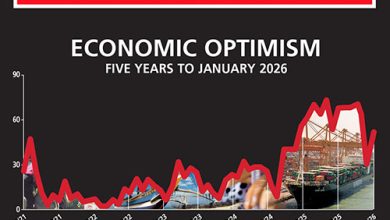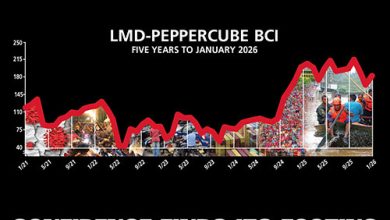BUSINESS SENTIMENT
The IMF recently approved the highly anticipated disbursement of US$ 334 million – the fourth tranche under its Extended Fund Facility (EFF).
POST-BUDGET DIP IN CONFIDENCE
Business confidence drops a few rungs after briefly matching its all-time high
Following the review, its Managing Director Kristalina Georgieva emphasised the importance of maintaining the reform agenda to decisively guide Sri Lanka towards sustainable and inclusive growth.
In his budget address, the president assured that the country is on track to resume its debt repayments by 2028, viewing it as a pivotal step towards long-term sustainable growth. He expressed optimism that the economy will accelerate by five percent this year with a similar growth trajectory anticipated in the medium term.
Additionally, Sri Lanka signed a landmark deal with Japan to restructure US$ 2.5 billion in loans, marking the first agreement with official creditors who pledged debt relief last year.
THE INDEX The LMD-PEPPERCUBE Business Confidence Index (BCI) dipped from February’s record equalling high of 204, shedding seven basis points to settle at 197.
Despite the dip however, the index stands 74 points above its historical median (123) and is 59 points higher than the 12 month average of 138. For context, the barometer registered 93 basis points at the same time last year.
PepperCube Consultants notes that despite the BCI’s slight fall, the business community remains optimistic – partly due to the government’s maiden budget.
It explains that the index signals “a period of consolidation, where businesses are navigating the balance between economic stabilisation and operational challenges alongside long-term investment uncertainties.”
PepperCube adds while the IMF bailout and budget have laid the foundation for optimism, addressing concerns such as taxation, red tape in the state sector and the bleak investment outlook will be crucial for sustained growth.
PROJECTIONS As we speculated last month, the index did not surpass its all-time high in the aftermath of Budget 2025. Corporates appear to remain cautious as the budget offered little relief despite the promises and expectations at election time.
In the meantime, questions will inevitably arise as to how the administration addresses shortages of essentials and the cost of staples.
In addition, it will have to contend with the uncertainty that surrounds the lifting of the vehicle import ban (for example, steep prices and the impact on our forex reserves), and the albeit temporary shortage of fuel that triggered overnight panic and a mini power crisis not so long ago.
Other developments to watch include the countdown to and outcome of the forthcoming provincial council elections, along with the impact (if any) of the world trade war that is unfolding at the behest of the Trump administration in the US.
As such, the coming months are likely to be marked by both speculation and uncertainty, which in turn may see the BCI shedding more ground… until stability returns to the macroeconomic landscape.







